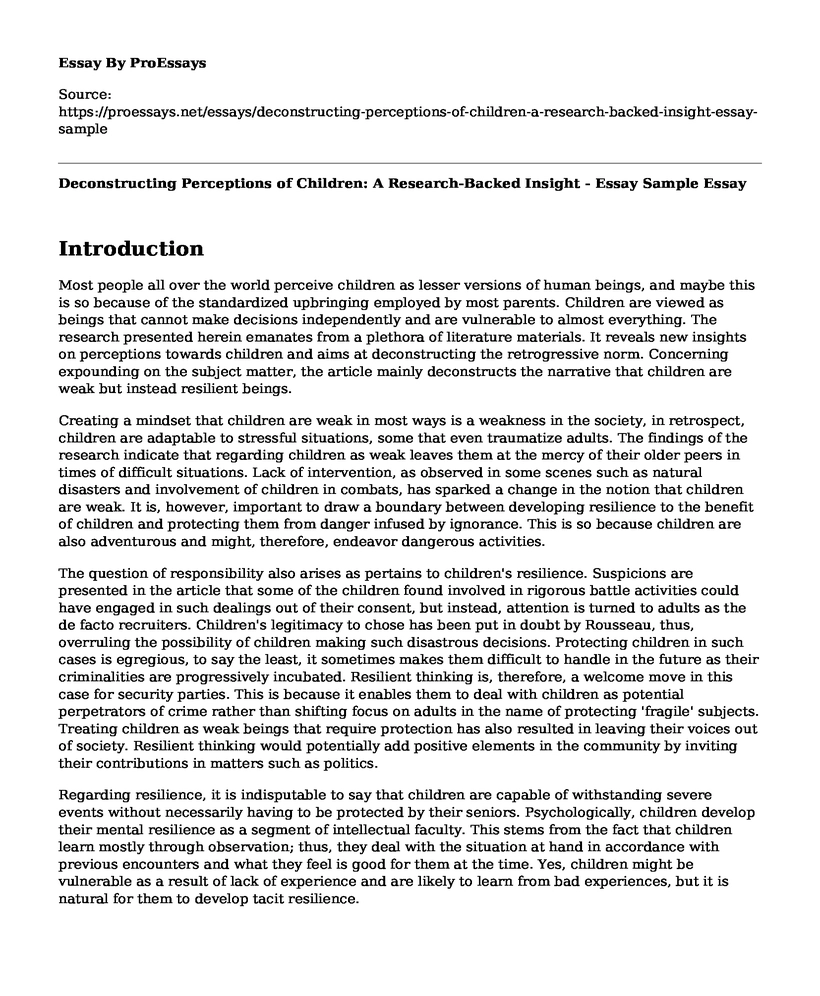Introduction
Most people all over the world perceive children as lesser versions of human beings, and maybe this is so because of the standardized upbringing employed by most parents. Children are viewed as beings that cannot make decisions independently and are vulnerable to almost everything. The research presented herein emanates from a plethora of literature materials. It reveals new insights on perceptions towards children and aims at deconstructing the retrogressive norm. Concerning expounding on the subject matter, the article mainly deconstructs the narrative that children are weak but instead resilient beings.
Creating a mindset that children are weak in most ways is a weakness in the society, in retrospect, children are adaptable to stressful situations, some that even traumatize adults. The findings of the research indicate that regarding children as weak leaves them at the mercy of their older peers in times of difficult situations. Lack of intervention, as observed in some scenes such as natural disasters and involvement of children in combats, has sparked a change in the notion that children are weak. It is, however, important to draw a boundary between developing resilience to the benefit of children and protecting them from danger infused by ignorance. This is so because children are also adventurous and might, therefore, endeavor dangerous activities.
The question of responsibility also arises as pertains to children's resilience. Suspicions are presented in the article that some of the children found involved in rigorous battle activities could have engaged in such dealings out of their consent, but instead, attention is turned to adults as the de facto recruiters. Children's legitimacy to chose has been put in doubt by Rousseau, thus, overruling the possibility of children making such disastrous decisions. Protecting children in such cases is egregious, to say the least, it sometimes makes them difficult to handle in the future as their criminalities are progressively incubated. Resilient thinking is, therefore, a welcome move in this case for security parties. This is because it enables them to deal with children as potential perpetrators of crime rather than shifting focus on adults in the name of protecting 'fragile' subjects. Treating children as weak beings that require protection has also resulted in leaving their voices out of society. Resilient thinking would potentially add positive elements in the community by inviting their contributions in matters such as politics.
Regarding resilience, it is indisputable to say that children are capable of withstanding severe events without necessarily having to be protected by their seniors. Psychologically, children develop their mental resilience as a segment of intellectual faculty. This stems from the fact that children learn mostly through observation; thus, they deal with the situation at hand in accordance with previous encounters and what they feel is good for them at the time. Yes, children might be vulnerable as a result of lack of experience and are likely to learn from bad experiences, but it is natural for them to develop tacit resilience.
Conclusion
In conclusion, this article articulates a noble subject matter that has previously received little considerations by previous studies. The findings of the research conclude that children are resilient beings and should be treated as such. This is because observations of children in difficult situations have proven they are resilient beings. Resilient thinking can be applied by a myriad of stakeholders, particularly security personnel, when making decisions concerning children and their involvement in a crime. Children should also be granted a chance to participate in social contributions such as political events.
Cite this page
Deconstructing Perceptions of Children: A Research-Backed Insight - Essay Sample. (2023, May 18). Retrieved from https://proessays.net/essays/deconstructing-perceptions-of-children-a-research-backed-insight-essay-sample
If you are the original author of this essay and no longer wish to have it published on the ProEssays website, please click below to request its removal:
- Obesity Among American Youth
- Gun Rights - The Paper to the Government
- Annotated Bibliography on Bullying in the Workplace
- The Treatment of Women in Islam: Annotated Bibliography
- Increasing the Effectiveness of Red Light Cameras Essay Example
- Research Paper on Intimate Partner Violence: A Growing Public Health Concern
- Essay Example on Wealth Inequality in Canada: The Growing Divide







